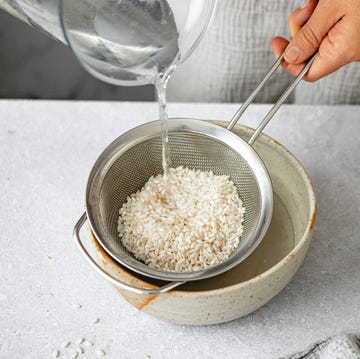So, you have a hankering for Mexican food and you're ready to cook up some enchiladas. But before you begin, you'll want to pour yourself a festive drink. Everyone knows that you have two options when it comes to Mexican spirits: tequila versus mezcal. But what exactly is the difference?
You may have heard that tequila is a type of mezcal, but not all mezcal is considered tequila. Confused? Don't worry, this guide will break it down for you. Learn about how tequila and mezcal are made, what to look for when shopping for a bottle, and the best ways to use them. So, whether you're making a classic tequila cocktail or Ree Drummond's Oklahoma Prairie Fire, you'll be prepared for taco night.
First, here's a little history lesson about tequila and mezcal. Before either of these spirits, there was "pulque," which was a naturally fermented, milky drink made from agave that was often considered sacred by the ancient Aztecs. According to Liquor.com, when the Spanish invaded Mexico in the 1500s, they used that same agave plant for distillation to create what is now known as mezcal. Soon after, blue agave plants were used to create tequila.
So, though it all may sound like they come from the same plant and therefore must be the same thing, there is actually a big difference between mezcal and tequila.
What Is Mezcal?
Mezcal is made from the heart of the agave plant known as the "piña." It's made in a traditional way that includes cooking the piña in an underground pit. This helps give the drink its distinct smoky flavor. If you like bold, assertive cocktails with a fiery kick, then give mezcal a try in your next cocktail recipe.
Besides for the flavor, one of the main differences between mezcal and tequila is that mezcal can also be made from various types of agave, while tequila can only be made from the blue agave. Most of the mezcal production today is in Mexican state of Oaxaca.
What Is Tequila?
Tequila is often referred to as a type of mezcal because it's also made from the agave plant. However, this time around, only one type of agave can be used: the blue Weber agave. When shopping for the best bottles of tequila, look for 100 percent agave tequila—this is the purest form. Another restriction that's given to tequila is where its produced. Most tequila is produced in Jalisco, Mexico. Though the flavor tends to be more neutral compared to mezcal, tequila can still have various complex flavors, especially when aged.
What Are the Different Types of Mezcal?
Mezcal is separated into three categories, based on their methods of production: mezcal (industrial), mezcal artesanal (from a specific region with a particular method like pit ovens), and mezcal ancestral (traditional harvesting with clay pot distillation). Producers will often refer to the type of agave plant used rather than age. While there are more than 20 varieties used in mezcal production, here are a few of the more common ones you'll find:
- Espadín is the most common agave used. Upwards of 90 percent of mezcal production uses this variety, and its the most similar to tequila.
- Tobalá is a rare variety that takes ten to 15 years to mature, so it's a bit pricier with an earthier flavor.
- Arroqueño is another rare variety that can take up to 25 years to mature. The result is more a more floral, complex profile.
- Tepeztate can also take up to 25 years to mature with more intense, spicier notes.
- Cuishe is from a wild, tree-like agave plant that produces a more vegetal notes.
What Are the Different Types of Tequila?
When determining what type of tequila to use, you can choose from different types of tequila based on how long they've been aged.
- Blanco or Silver tequila is often clear and only aged for less than two months.
- Reposado will be more gold in color with a two-month minimum for aging.
- Joven is a mix of the clear tequila and an aged tequila that also has a golden color.
- Añjeo is aged for at least one year and has a distinctly dark color. For an even darker and richer option, look for bottles labelled extra añjeo.
How Are Mezcal and Tequila Different in Flavor?
Every type of mezcal and tequila will have their own flavor profiles (much like any other spirit, wine, or beer). But the most noticeable difference on the your palate will be the distinct robust flavor of roasted agave in mezcal, which most people will describe as "smoky." Of course, each kind will vary in intensity, but it is the most noticeable distinguishing feature.
Can You Substitute Mezcal for Tequila?
Both mezcal and tequila are great options for pairing with traditional Mexican dishes or even Tex-Mex dishes for that matter. They can even be easily used interchangeably for most drinks as long as you're aware of the flavor difference. If you want to try swapping in mezcal for tequila in a classic margarita or a simple ranch water, just be prepared for a burst of smoky flavor.














